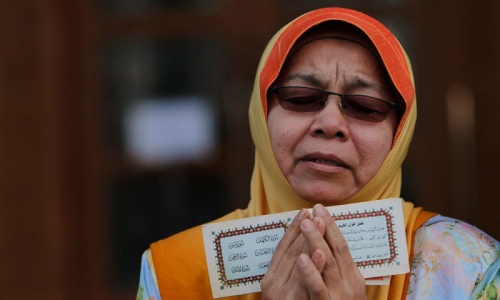'Allah' rings out in Malaysian churches despite ban

KUALA LUMPUR: Malaysian churches defiantly continued to use the word “Allah” to refer to the Christian God in Sunday services despite the Muslim-majority country's leader saying they must obey rules against it.
Malay-speaking Christians prayed and sang hymns using the Arabic word, a practice they have observed for hundreds of years but now the focus of an increasingly tense religious row in the Southeast Asian nation.
“They all contain the word 'Allah',” a pastor at a church near the capital Kuala Lumpur said of the songs sung by his congregation.
“(The Malay-language Bible) contains the word 'Allah'. When we preach we have to read the text. It's a really difficult situation,” he added, speaking on condition of anonymity due to the passions surrounding the issue.
Under pressure from Muslim conservatives, Prime Minister Najib Razak said on Friday that Malaysian Christians must heed rules forbidding them from using the word.
Islamist leaders in the country say “Allah”, which also is used by Malay Muslims to refer to their creator, is exclusive to their religion and must not be used by non-Muslims.
Muslim ethnic Malays make up more than 60 per cent of the diverse country's 28 million people.
Malaysia has sizeable ethnic Chinese, Indian and other communities. About 2.6 million people are Christians.
Church leaders have vowed not to back down.
“Christians in Malaysia have no choice but to use the Malay-language Bibles. To say they cannot use these bibles, it means saying 'you are not allowed to worship in the language that you want',” Rev. Hermen Shastri, general secretary of the Council of Churches of Malaysia, told AFP.
The government in 2007 ordered a Malaysian Catholic weekly newspaper to cease use of the word, arguing it could entice Muslims to convert, which is illegal for adherents of Islam in Malaysia.
The newspaper has launched a long-running court challenge, angering Muslim conservatives, who have demanded Christians use alternative Malay words.
“Why insist? They have an option. They don't really have to use 'Allah' to worship,” said Yusri Mohamad, chairman of Muslim rights group Pembela. “This is unnecessary provocation... This is not healthy for Malaysia.”Muslim conservatives have suggested Christians use other Malay words, such as “Tuhan”, to refer to God.
Malaysia has avoided overt religious conflict for decades and is generally seen as a moderate Muslim country.
But non-Muslims allege growing intolerance by influential Islamic conservatives.
“We feel angry. It's unfair,” a Christian church-goer said after Sunday's service. “It's no longer peaceful between Christians and Muslims now.”The Malaysian Catholic church argues “Allah” has been used by Christians in the country for hundreds of years and that the word predates Islam's founding.
Tensions sparked by the issue triggered a spate of attacks in 2010 on places of worship, mostly churches. Najib's Muslim-dominated government responded in 2011 with a compromise allowing Christians limited use of the word.
But he backed away from that Friday, saying the compromise was subservient to state laws and royal decrees forbidding non-Muslim use of “Allah”.
Those rules have historically been rarely enforced.
But as pressure from Muslim conservatives rose, Islamic authorities cited one such law earlier this month to seize hundreds of Bibles from a Christian group.












































